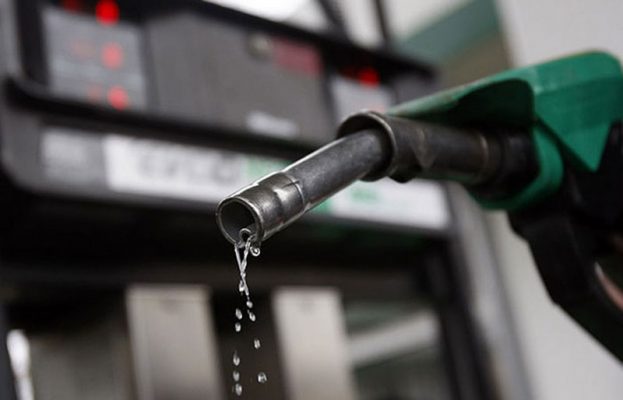There is no respite for Lagos residents over the lingering fuel scarcity as Major Oil Marketers Association of Nigeria (MOMAN) has increased the price of petrol to N185 per litre without official notification.
Fuel scarcity persisted on Friday as long queues disrupted traffic flow resulting to gridlocks across the Lagos metropolis.
Some of the stations visited like Mobil, Conoil, TotalEnergies, Nipco, Enyo, Forte and NORTH-WEST had adjusted their pump price to reflect N185 per litre against N169 previously.
Motorists in Lagos who queued for several hours at filling stations operated by major marketers were shocked to notice the adjustment of the pump price.
Many major filling stations in Lagos metropolis, especially Ikeja and Agege areas were not dispensing, only a few stations were dispensing while motorists scrambled to fill their cars.
The stations dispensing at Mobolaji Bank Anthony, Grammar School, Berger were NNPCL station and Bovas along Ogunnusi/Isheri road.
Also, Mobil filling station at Agidingbi-Ikeja started selling with queues extending to Fela Shrine from Ashabi Cole Crescent/CIPM Avenue road.
It was also observed that some independent filling stations were selling between N260 and N270 per litre along Ikorodu, Somolu, Bariga, Ikotun and Akran, Awolowo road.
Some marketers who preferred anonymity told NAN that the federal government had begun the subsidy withdrawal, urging marketers to adjust their pump price.
The marketers claimed that government may have commenced a gradual removal of the petrol subsidy.
However, efforts to get reactions from MOMAN and Independent Petroleum Marketers Association of Nigeria (IPMAN) was unsuccessful as key marketers’ associations were still considering an appropriate pump price.
A source who declined to be mentioned said, “Marketers have been officially directed to change the pump price of petrol.
“Go to stations operated by major marketers you will confirm what I have told you.
“But I think it shouldn’t be above N185 a litre. I can tell you too that depot owners are not expected to raise their prices but they have been asked to recover their costs by adjusting their prices.”
The cost of fuel pump increased from N87 per litre as of December 2015 to N165.77 by December 2021, which is an increase of 90.54 per cent, according to the Fuel Pump Price Per Litre – Average (PMS) data from the Central Bank of Nigeria (CBN).
Mr Mike Osatuyi, the National Operations Controller of IPMAN, said his members were still waiting for the Nigerian National Petroleum Company Ltd. (NNPCL) to fulfill its part of the agreement reached at the meeting by supplying them fuel directly instead of the present arrangement where they had to buy from a “third party.”
Osatuyi regretted that despite the change of leadership at the NNPCL retail arm, the situation had remained the same.
“We reached an agreement with NNPCL for direct fuel supply since last month, but up till now, we are yet to get the supply.
“We are still buying from private depots who sell the product to us at N230 per litre and by the time it reaches our stations it is at N250 per litre.
“So, we cannot sell at government regulated price because we don’t even get it at regulated price,” he explained.
According to Osatuyi, supply issues are yet to be resolved and that is why the major marketers are not selling regularly.
Besides, Osatuyi said some of the filling stations selling at the regulated price of N180 per litre were only putting up an appearance in the public, whereas behind the scene, from their depots, they sold the commodity to private marketers at N220 per litre.
“That is why some of them don’t have fuel to sell in their stations as they would have made more money selling to the independent marketers at a higher price,” he said.
He regretted the situation IPMAN found itself because its members were not comfortable selling fuel at N250 or more per litre, but that their hands were tied as they could not run at a loss.
“Even some of our members are wondering if we have compromised on this issue because they cannot believe that by now NNPCL would not have started selling fuel to us at the official price as agreed in that meeting,” he said.
Osatuyi has assured that the group will confirm to Nigerians when NNPCL starts dispensing fuel to its members at the official price and Nigerians should expect reduced price of PMS if NNPCL fulfills its promise of direct supply to his members.
“This is what we have been clamouring for because IPMAN has been buying petrol for N220 from private depots in this period.
“Whereas NNPCL supplies the product to depots at N113 per litre, while depots sell at N148.17 per litre and filling stations sell at the regulated price of N170 to N180 per litre.
“Instead of selling to IPMAN at the approved N148.17 per litre, as they used to do before, private depots were selling to us at N220 per litre, so how could we have sold to the public at N170 per litre?” Osatuyi asked..
Mr Clement Isong, the Executive Secretary of MOMAN refused to answer questions on the pump price increase.
Isong said despite the volume that the NNPCL was supplying, the demand for the product kept rising, suggesting there was increase in demand from states.
On why the demand for petrol is high, he said, “I don’t know but I suspect that it is cross-border demand that has gone up.”
Efforts to get the Nigerian Midstream and Downstream Petroleum Regulatory Authority (NMDPRA) and NNPCL to comment proved abortive as both refused to pick their calls and respond to messages.



